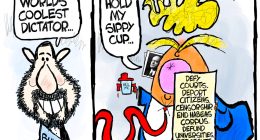A French pilot was spared from serving any time in prison — but was banned from flying for a year — for decapitating a wingsuit skydiver with the wing of his plane.
The aviator, who has not been identified, was found guilty Tuesday of involuntary manslaughter and operating a plane without a valid pilot’s license, and was given a 12-month suspended sentence in connection with the grisly July 2018 skydiving accident that killed 40-year-old Nicolas Galy.
As part of his punishment, the pilot was barred from flying for one year, reported the French newspaper Le Parisien.
The Montauban criminal court also fined the pilot’s employer, the Midi-Pyrénées Skydiving School Association, 20,000 euros, half of which was suspended.
In the wake of the tragedy, security measures have been stepped up and briefings have become mandatory at the skydiving school, according to its president, Isabelle Deschamps.

On July 27, 2018, Galy was less than 20 seconds into his jump over the French town of Bouloc-en-Quercy when he smashed into the wing of the single-engine Pilatus plane at 14,000 feet and was instantly beheaded by the aircraft’s wing.
At the time of the incident, the plane was making a rapid descent as Galy and another skydiver were gliding in their wingsuits, the court heard in September.
Read Related Also: Mexican News Outlet: Cartels Have Rocket Launchers at the Border
Prosecutors argued that pilot error was to blame for Galy’s gruesome death, but the aviator denied any wrongdoing, claiming that the victim “did not follow the expected course and should never have been on that course.”
“I think my flight path made sense,” the pilot testified. “This has been the tragedy of my life but I am not at fault.”

The pilot, however, admitted that he had not briefed the skydivers before their fateful jump.
He then lost sight of them and assumed that they were further south.
It also emerged during the trial that the pilot was flying with an invalid license.
A lawyer representing the victim’s family said during a hearing in September that the case involved “a lot of recklessness or negligence.”








